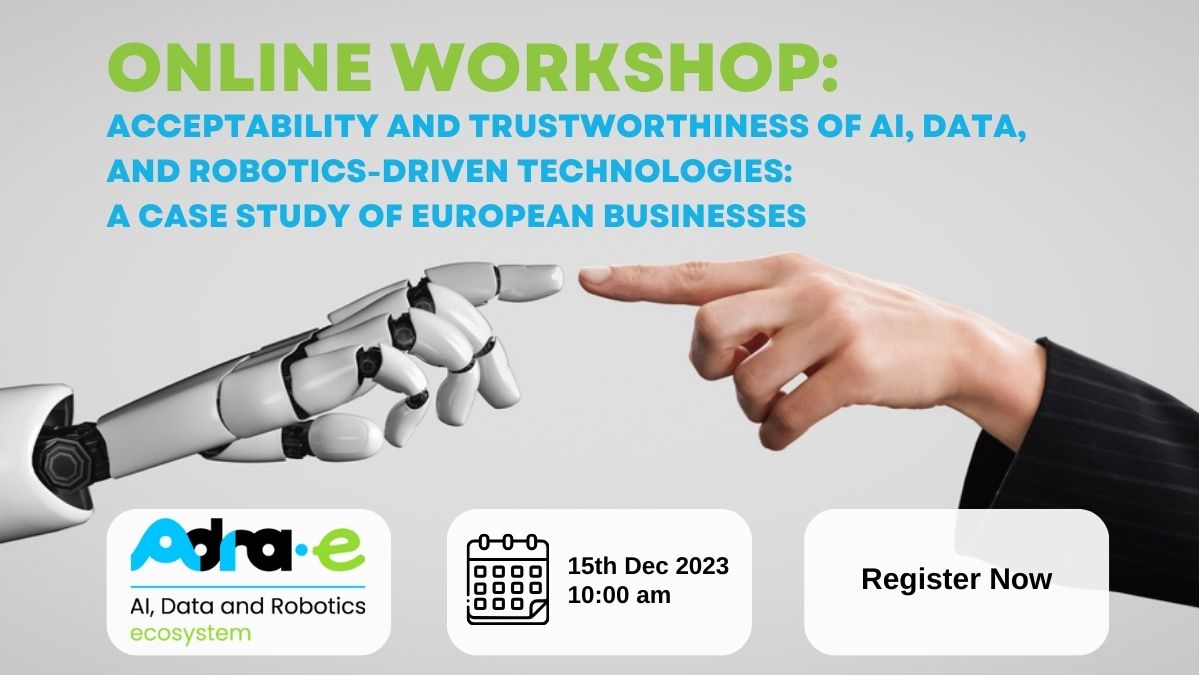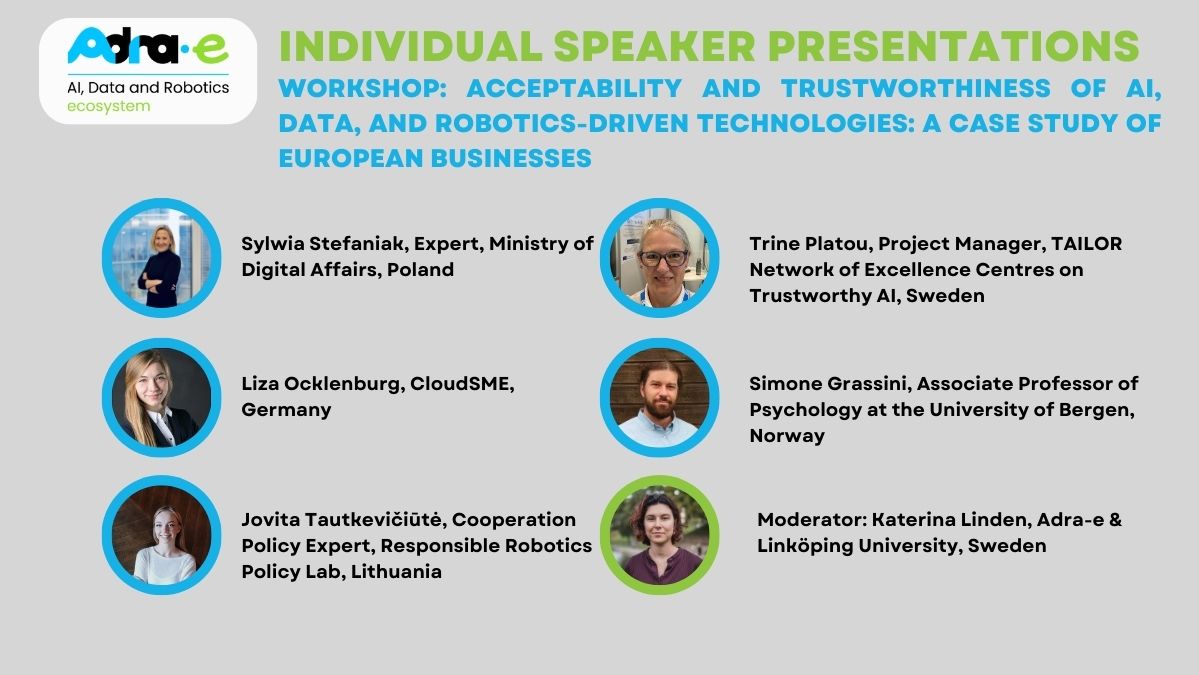
European companies should utilise more AI, Data, and Robotics (ADR) solutions, but how can this goal be achieved? Our research at Linköping University suggests that for successful adoption of these technologies, companies must first be aware of their existence, trust them, and be willing to explore their use.
The practical focus of this webinar is to examine the approaches and methods employed in Europe by various stakeholders to achieve this goal.
The "cases" mentioned in the workshop title refer to the speakers who represent diverse stakeholders of ADR adoption, including academia, business, support networks, and government. During this online event, we aim to learn about the initiatives undertaken by these stakeholders from different parts of Europe to promote ADR technology adoption. We will gain insights into their experiences, challenges, and achievements. We will engage in discussions on critical issues and address questions from the audience. While diverse perspectives are encouraged, we will prioritize a discussion on trustworthiness and acceptance of ADR technologies.
Workshop Agenda:
Introduction (10 minutes)
- - Welcome and Introduction to the Workshop
- - Brief Overview of the Workshop's Purpose and Goals, presentation of the Work Task
Speaker Introductions (10 minutes)
- - Introduction of each Speaker and their Background
- - Brief Overview of how their background contributes to a more comprehensive understanding of Acceptability and Trustworthiness, posing a question to the speakers:
Main question: How, from your professional standpoint, do you in your area work towards establishing trust and acceptance in AI, Data, and Robotics among businesses/organizations/individuals? What are your struggles and what are your achievements?
Individual Speaker Presentations (40 minutes)
Sylwia Stefaniak, Expert, Ministry of Digital Affairs, Poland (10 minutes)
Liza Ocklenburg, CloudSME, Germany (10 minutes)
Jovita Tautkevičiūtė, Senior Consultant at Civitta, Responsible Robotics Policy Task lead at Robotics4EU project, Lithuania (10 minutes)
Trine Platou, Project Manager, TAILOR Network of Excellence Centres on Trustworthy AI, Sweden (10 minutes)
Simone Grassini, Associate Professor of Psychology at the University of Bergen, Norway (10 minutes)
Facilitated Panel Discussion aka Virtual Workshop (25 minutes)
Main question: What steps are needed to democratize ADR technologies in Europe? Let's brainstorm some very practical recommendations (including the ones for the European Commission!) to support this goal.
Audience Q&A (10 minutes)
- - Open the floor for additional questions from the online audience
- - Panelists provide responses to audience questions
Closing Remarks (5 minutes)
- - Summary of Key Takeaways and Insights
- - Acknowledgment and Thanks to Speakers and Participants
Total length: 1h40m

Moderator: Katerina Linden
A postdoctoral researcher in AI technologies development and implementation, she conducts an analysis of stakeholders in the implementation and development of ADR technologies, contributing to the Reasoning and Learning lab at the Division of Artificial Intelligence and Integrated Systems at Linköping University, Sweden, while also working for Adra-e — a collaborative initiative aimed at enhancing EU competitiveness through AI, Data, and Robotics initiatives.
Sylwia Stefaniak
Expert at the Ministry of Digital Affairs, involved in projects related to Artificial Intelligence, Internet of Things and data analytics; Manager at Mazovia EDIH project which main objective is to support the implementation of key enabling digital technologies. She is pursuing a PhD in Artificial Intelligence in the discipline of Political Science and Administration at SGH Warsaw School of Economics.
Liza Ocklenburg
Product Manager at CloudSME, Head of the emGORA workspace, Coordinator of DIGITbrain, building and shaping the digital B2B ecosystem, facilitating the European solution diversity and democratizing access to digital services for manufacturing & engineering companies.
Jovita Tautkevičiūtė
Senior Consultant at Civitta, Responsible Robotics Policy Lab, Robotics4EU, specizlizing in policy recommendations. With her background in science, technology studies and development cooperation policy, Jovita is interested in the social and cultural implications of technological innovations.
Trine Platou
Project Manager at TAILOR Network, one of the ICT-48 AI Networks of Excellence, specializing in leveraging and combining learning, optimization and reasoning. Her background is in medical technology and life sciences, with a PhD in biophysics and work experience primarily in start-ups in various roles (CEO, CTO, QA/RA).
Simone Grassini
Associate Professor of Psychology at the department of Psychosocial Science of the University of Bergen, Norway. His research interests include environmental psychology, human-computer interaction, Artificial Intelligence, cognitive neuroscience, human factors and cognitive ergonomics. He studies how humans interact with natural and artificial environments, using various experimental methods.